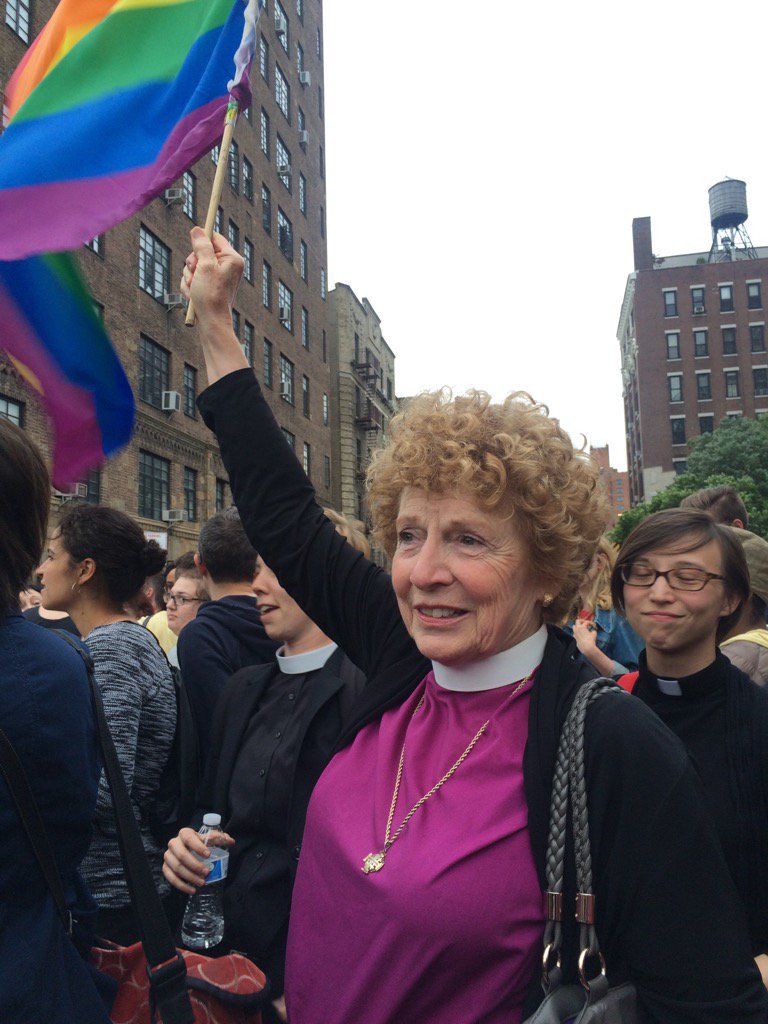We commend Bishop Jane Allen Middleton for offering clarification of the proper sphere of the work of the Board of Ordained Ministry and hope that the Judicial Council will find her reasoning persuasive when it passes judgment on her ruling in the spring. Her ruling is published on the NYAC web site.
A summary of the issues is provided here. We will follow and report on these developments as things evolve, but there should be no illusion about the limitations of dealing with the Judicial Council or the General Conference when it comes to justice for LGBTQI persons. The only reason that the 2016 General Conference did not pass sweeping draconian punitive measures that would have tied the hands of Bishops, Boards of Ministry, and anyone else involved in seeking LGBTQI equality in the church was that the General Conference was brought to crisis by protest. The Judicial Council has made clear that it has no intention to seek justice for LGBTQI persons, seeing its role only in terms of the narrow interpretation of the Discipline of the United Methodist Church.
Summary of the Case:
Since the June 2016 New York Annual Conference session there has been a legal back-and-forth involving a challenge by an opponent of LGBTQI equality to the rulings made at the 2016 Clergy Session by then Interim Bishop Jane Allen Middleton. The challenge relates to declarations of the New York Annual Conference Board of Ordained Ministry prior to the 2016 annual conference affirming equal consideration of all qualified candidates and the significance of that affirmation for the voting on clergy candidates at the 2016 Clergy Session.
At the Clergy Session of the 2016 Annual Conference, by near unanimous vote, thirteen candidates for provisional membership and fourteen candidates for full membership as an ordained elder were approved as recommended by the Board of Ordained Ministry. In the midst of this joyful affirmation an associate member without vote requested a Decision of Law on four questions related to whether certain proceedings and procedures of the Board of Ordained Ministry were in accordance with the Book of Discipline’s stipulations.
Interim Bishop Jane Allen Middleton ruled at the annual conference session that the affirmation and ordination of these candidates was indeed in order. In July 2016, as required by church law, Interim Bishop Jane Allen Middleton issued a formal written statement in support of her rulings at the annual conference session. As per church law, her statement was reviewed by the Judicial Council. In October 2016 the Judicial Council affirmed her rulings in part, but reversed her ruling on two points, requiring her to respond to the following two questions posed by the opponent of LGBTQI equality at the clergy session.
Question 1: “Is the Conference Board of Ordained Ministry required to ascertain whether a candidate meets the qualifications for candidacy and ordained ministry, including whether or not she or he is exhibiting ‘fidelity in marriage and celibacy in singleness’ or is a self-avowed practicing homosexual?”
Question 2: “Can the Conference Board of Ordained Ministry legally recommend to the clergy session a candidate whom they believe to be a self-avowed practicing homosexual or otherwise in violation of the fidelity and celibacy standard?”
In her December 20, 2016 Decision of Law II Bishop Middleton answered “No” to both questions. The explanations for her replies are now published.
We believe that the Bishop is correct that “ascertain” is a level of inquiry that goes beyond what Boards of Ordained Ministry are required to do. The term suggests that instead of being an entity that measures the effectiveness of candidates for ministry, the Board of Ordained Ministry is to be an inquisitorial body that investigates bedroom practices in great detail. That is not what Boards of Ordained Ministry should be about.
As to the second question, to jump to a conclusion about someone’s sexual practice simply based on “belief” would be improper as well. To endanger someone’s future in ministry with a subjective opinion about something that can be objectively determined would be highly inappropriate.
We commend Bishop Middleton for the wisdom and clarity of her responses to these questions.
Our Task:
Regardless of the response of the Judicial Council to Bishop Jane Allen Middleton’s ruling, justice and progress will prevail only through the continued Biblical Obedience by clergy, laity, Boards of Ministry, annual conferences, and local congregations in support of the full and equal embrace of LGBTQI persons in every sphere of the church’s life. It is good to stay informed in these matters, but it is of greater importance to make your witness and to insist upon and to act upon the principle of equality in your role as a layperson, as a local church leader, as a clergy person, as a member of The Board of Ordained Ministry or of a District Committee on Ministry, as a District Superintendent, or as a Bishop.


